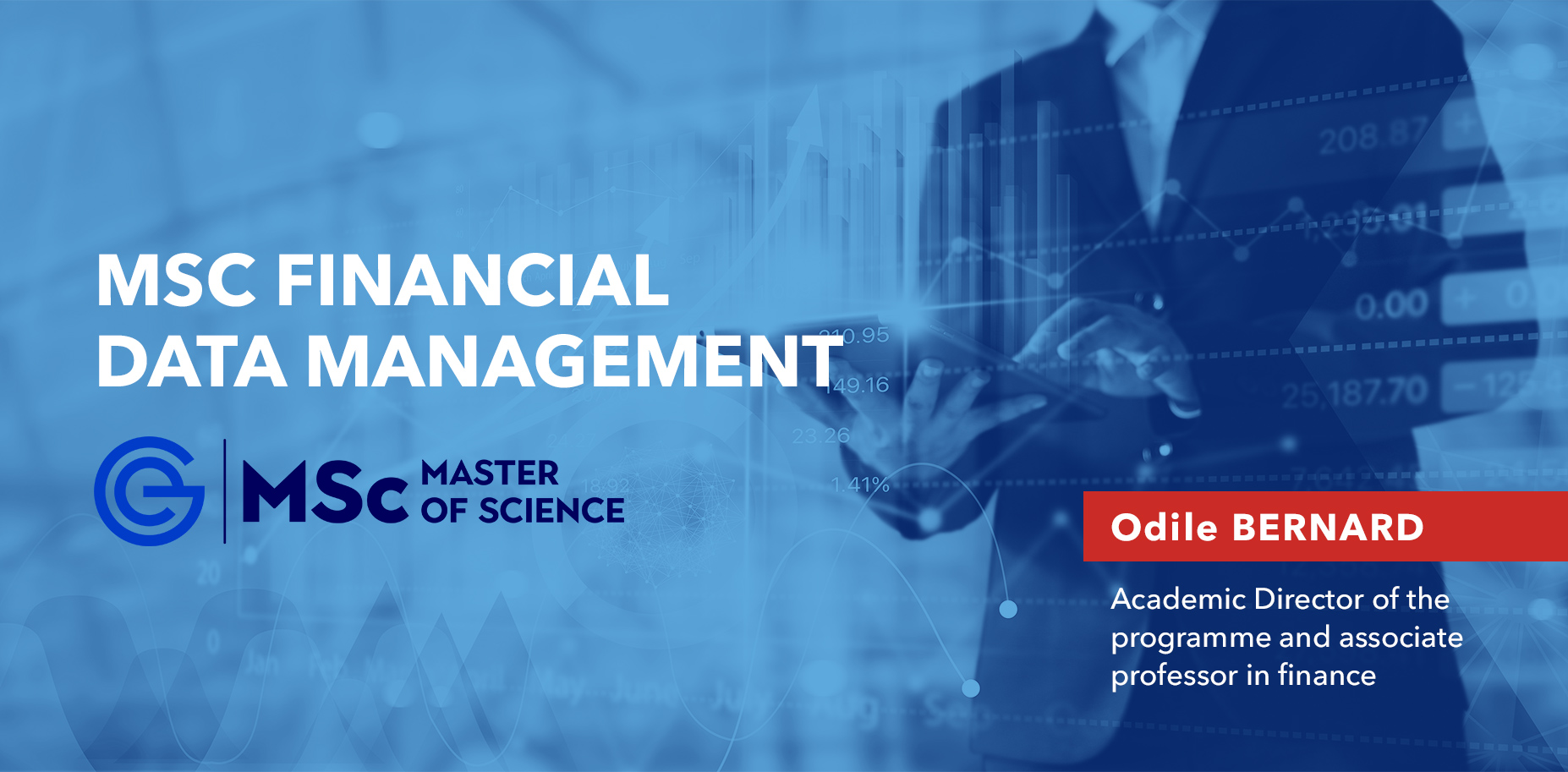With digitalisation, the role of the finance manager is now taking on an increasingly strategic dimension for which it is imperative to prepare students. To meet this challenge, the EM Normandie Business School is launching an MSc Financial Data Management at the start of the 2020 academic year. Accredited by the Conférence des Grandes Ecoles in April 2020, this 18-month programme, taught in English, combines face-to-face teaching, company missions, bootcamps, internships, and a final thesis. The training is also available in the final year of the Master in Management. Meeting with Odile Bernard, Academic Director of the programme and associate professor in finance.
What are the major contemporary transformations that the world of finance is undergoing today?
“The working environment in which financial services evolve is radically transformed by innovations due to digital technologies. These changes concern both mentalities and practices, but above all, the notion of temporality, which is being entirely revisited. Following the advent of all these opportunities, but also of these pressures on employees, the finance departments of companies must face new requirements and thus move from a role of control and supervision to one of performance management.
By having exploitable and essential data across many areas of the business, the finance department strengthens its central position in the organization: it is now possible to speak of the digital leadership of the CFO and the finance team. The objective of the finance manager and management audit, renamed performance management, is to meet the challenges of evolution in these professions while remaining efficient.
The conventional tools based on office automation that are no longer sufficient to be effective are gradually being replaced by new emerging tools based on automation, visualisation and Artificial Intelligence technologies.”
There is more and more talk about the explosion in the volume of data to be processed with Big Data, how is the financial world taking ownership of this?
“The first step is to answer many questions, which are still relevant today: how to develop reliable predictive tools? Will tomorrow’s management control allow us to improve business performance through more agile management?
The use of Data allows to highlight hidden causal links, to discover correlations, and thus to allow a more refined management. Both creative and critical analyses require the full capacity for reflection and interpretation on the part of the financial analyst. At this stage in the progress of the digital transformation, an added value is observed, some pitfalls have been avoided but many others – still unsuspected – will be encountered later on, and many challenges remain to reach the target vision.”
These transformations necessarily call for the acquisition of new skills in Finance, what are they and how can they be acquired? What are companies looking for in finance?
“In a context where agility in decision making has become essential and where the environment is increasingly uncertain, it is necessary to know how to manage volatility and uncertainty.
The tools implemented are more predictive than before and the future is moving towards prescriptive tools. These new tools, which range from Key Performance Indicators (KPIs) to predictive analysis software, integrate Artificial Intelligence (AI) and Machine Learning techniques. The challenge is now to select the right information and perform the best analysis from the Data, to enable optimal decision-making and efficient timing.
These new skills allow the finance managers to be more efficient but also more attractive. Beyond the speed of reaction, the reduction of costs and the risk of errors, the finance manager is increasingly oriented towards consulting capabilities in terms of the company’s global strategy. The commitment of the employees is achieved through an adapted managerial behaviour of the finance manager.
Indeed, tomorrow’s finance manager is an ally of the general management: through their forward-looking vision, they are a stakeholder in the development of the strategic plan, beyond the investment choices. Thanks to their in-depth knowledge of the organization, they facilitate decision-making. Their role as Business Partner mobilises managerial skills in order to coordinate, communicate, and work in project mode. Data mining requires analytical skills and intelligence in the interpretation of information. His role will be to anticipate what is going to happen rather than to control what has happened. The key words in their analyses are relevance, speed and low cost, allowing for risk reduction, and flexibility. ”
What are the advantages of M2/MSc Financial Data Management?
“This programme fully integrates the digitalisation of the business lines and the development of the role of the finance manager towards the company’s strategy. The students acquire knowledge on emerging technologies that reinforce their credibility as finance managers with a strong understanding of future challenges. They learn how to take advantage of these future-oriented features.
At the end of the course, the future finance managers will be able to manage data and extract usable information from it, as well as communicate to other departments on the results of their analyses and recommendations. They will thus be able to actively participate in the constant improvement of the company’s performance, or even initiate it. They will have acquired an ability to influence strategic decision-making and the overall strategy of the company. They will have learned how to generate and control the agility of the company, which is necessary for its performance. The multidisciplinary team management approach is in line with the recent cooperation between the finance manager and the Data Scientist.
Beyond the learning process, students work on simulations and case studies using various software (Power B.I., R & RStudio…). The aim is to perceive the impact of decisions on the general strategy of the company. ”
What are the opportunities for students?
“Students can work in a field that combines strategic relaying to the general management and support to operational staff. All companies, from start-ups to multinationals, are considering, have already initiated or are currently finalising the digital transformation of their financial services. All sectors of activity, without exceptions, are impacted.
All areas of corporate finance are accessible to young graduates; both traditional professions and those revisited by digitalisation. For example: Junior Finance Manager, Liquidity Manager, Credit Manager, Performance Manager, Financial Communication Manager, Risk Manager, etc. Currently, Finance positions must reflect on their own development, while remaining a support and facilitator for the transformation of the entire company. This is the challenge for which students are prepared. ”
About Odile Bernard, Academic Director of the M2/MSc Financial Data Management EM Normandie
After ten years of experience as Administrative and Financial Director in SMEs in the building finishing sector, Odile Bernard has acquired a very global vision of the various functions of a company. In 2010, she presented a doctoral thesis in management sciences at the University of Paris Est on a problem related to the appropriation of management control tools. She has been an associate professor in finance at the EM Normandie since 2011. Her objective: to transmit to students the pleasure of managing a company.





